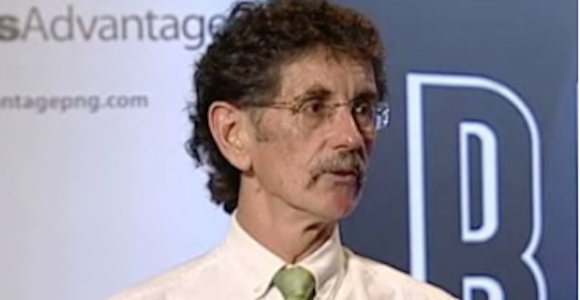Robin Fleming, Chief Executive of Bank South Pacific – Papua New Guinea’s biggest bank – says foreign exchange availability is improving. In this exclusive interview with Business Advantage PNG, he also discusses BSP’s approach to risk, and new digital offerings.

BSP’s Robin Fleming says foreign exchange situation improving. Source: EMTV
Business Advantage PNG (BAPNG): What is the situation with the availability of foreign exchange?
Robin Fleming: Most customers within the small-to-medium range, who have kina available, are, generally speaking, getting orders filled within about three weeks. Which is an improvement on where it was 12 months ago.
BAPNG: You have been able to maintain strong profitability in this market during a period when both ANZ and Westpac have restructured their presence in Pacific markets. What does that say about the difference between BSP and its International competitors?
Fleming: It is because we’re a PNG-owned bank and therefore our assessment of PNG risk is based on people who have lived here, in many cases for much of their life. Because we’re closer to regulators, close to people who make decisions, we have a good insight into how business is operating. We can make a far more informed assessment of the real risk associated with PNG—in PNG.
‘In PNG, our market share is 61 per cent; five years ago, our market share was 45 per cent.’
I have no doubt that the country managers for the other banks have probably got a view of PNG risk which is somewhat similar to mine. There is no particular market sector we would target that the ANZ or Westpac wouldn’t target, it’s just they probably find it a bit more difficult to get some of those transactions over the line. BSP as a group is resilient because we’ve been in a position to have profits coming in from other countries: Fiji, Cook Islands and Tonga. It all adds up. In PNG, our market share is 61 per cent; five years ago, our market share was 45 per cent.
BAPNG: What is your view of the competitive landscape in banking?
Fleming: BSP is the only bank, for whatever reason—whether it’s legacy, design or otherwise— that is in every province and every district. Whereas other banks choose where they want to operate. That isn’t necessarily good for the consumer, nor is it necessarily good if you’re looking at it from a GDP, economic growth, perspective.
BAPNG: Over the last five-to-seven years, there has been a process of trying to digitise the banking process as much as possible. How much further is there to go?
Fleming: We can all develop the digital offerings. The real enablers are going to be around the capability of the MNOs (mobile network operators) to have data-capable products available at a low cost to the user, particularly in the SME market—and also to have broad coverage of low-cost telephone devices for our customers. How are we going to be able to get customers to start using a means of purchase other than cash? How do you go to the fish market and pay for your fish? How do you pay for your vegetables? They have to be able to turn on a mobile phone with a QR (Quick Response) reader, or some form of payment service of the kind that you have in Australia. The opportunities for low-cost internet services for SME businesses will be enormous. For example, if you get a low cost accounting package that a small SME can use, even if it’s only got simple information, that can then be exported to the bank. That hopefully improves the capability of those businesses to pay their taxes and the bank to make a credit decision.
BAPNG: Looking forward three-to-five years, where do you see PNG’s economy sitting?
Fleming: By 2022-23, we will have a new LNG project, Papua LNG, requiring US$12-14 billion over a five-to-seven year period—back-ended by an extension to the existing PNG LNG. This will converge with a wind-down of the accelerated depreciation and some of the debt obligations associated with PNG LNG. So, the prospects for strong fiscal underpinning appear to be very, very sound.









Speak Your Mind